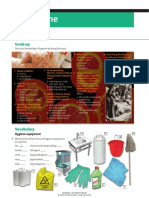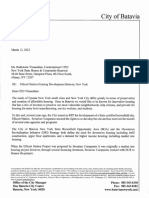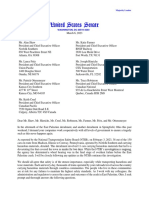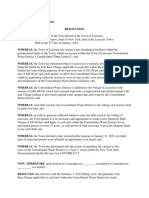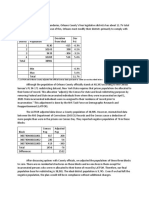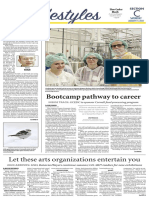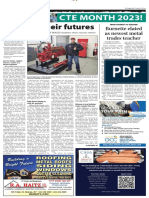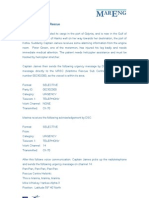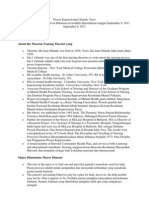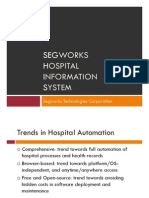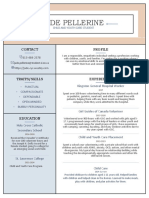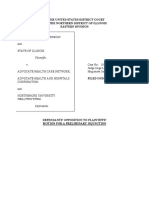Professional Documents
Culture Documents
Massena Memorial Hospital Community Report
Uploaded by
Watertown Daily Times0 ratings0% found this document useful (0 votes)
2K views22 pagesA report about the future of Massena Memorial Hospital, Massena, NY
Copyright
© © All Rights Reserved
Available Formats
PDF, TXT or read online from Scribd
Share this document
Did you find this document useful?
Is this content inappropriate?
Report this DocumentA report about the future of Massena Memorial Hospital, Massena, NY
Copyright:
© All Rights Reserved
Available Formats
Download as PDF, TXT or read online from Scribd
0 ratings0% found this document useful (0 votes)
2K views22 pagesMassena Memorial Hospital Community Report
Uploaded by
Watertown Daily TimesA report about the future of Massena Memorial Hospital, Massena, NY
Copyright:
© All Rights Reserved
Available Formats
Download as PDF, TXT or read online from Scribd
You are on page 1of 22
The Future of
Massena Memorial Hospital
Summary Report to the Community
July 14, 2014
July 14 2014
The Future of Massena Memorial Hospital Report to the Community 2
Table of Contents
Overview ................................................................................................................. 3
Letter from MMH CEO/Board Chair ................................................................................... 3
Our Guiding Principles .................................................................................................. 5
How this report was written........................................................................................... 5
About MMH ............................................................................................................... 6
Updated Financial Information ........................................................................................ 6
Revised Financial Projections (MMH remains a municipal hospital) .......................................... 7
Revised Financial Projections (Three-year wage freeze, MMH remains municipal)........................ 8
How did we get here? .................................................................................................. 8
Our Options .............................................................................................................. 9
1. No action ........................................................................................................ 9
2. Merger/Sale ..................................................................................................... 9
3. State/Federal bailout ........................................................................................ 10
4. Conversion to public benefit corporation ................................................................. 10
5. Conversion to a financially independent nonprofit ...................................................... 10
Revised Financial Projections (MMH becomes a nonprofit hospital) ........................................ 12
6. Three-year wage freeze ...................................................................................... 12
Other possible alternatives ........................................................................................... 13
Become a Critical Access Hospital .......................................................................... 13
Special Pension Legislation .................................................................................. 13
Potential savings from a new health insurance plan .................................................... 14
The public information process ...................................................................................... 14
Questions and Answers ................................................................................................ 15
General questions ................................................................................................... 15
Financial analysis/potential savings .............................................................................. 16
Becoming a nonprofit ............................................................................................... 18
Hospital operations ................................................................................................. 20
Plans for a merger or affiliation .................................................................................. 21
Town/Taxpayer issues .............................................................................................. 21
Pension issues ........................................................................................................ 21
Next steps ............................................................................................................... 22
July 14 2014
The Future of Massena Memorial Hospital Report to the Community 3
Overview
MMH faces an imminent financial crisis and possible closure
We as a community face difficult choices
The stakes are high for everyone
We are committed to considering all options and making a decision together
Our goal is to serve the best interests of all the people who depend on MMH
Letter from MMH CEO/Board Chair
Dear Neighbors,
This report is part of a continued process for our community to determine the future of
Massena Memorial Hospital. The hospital is in the midst of a financial crisis and, unless we act
proactively to take a new path, MMH will be forced to close no later than 2017, and perhaps
within the next 18 months.
The main driver of the hospitals financial crisis is our required contribution to the New York
State Pension plan, which is currently more than $4 million a year far more than comparable
regional hospitals pay for their private pension plans. Even if the economy improves and
pension contributions decline, the reduction in NYS pension contributions will be moderate
and gradual it will not be enough to allow MMH to avoid running out of money and closing
our doors.
Though, we were recently notified that MMH may receive up to $4.25 million in an Interim
Access Assurance Fund (IAAF) grant from the New York State Department of Health by the end
of the year, the hospitals financial situation continues to worsen and we are at the point
where we will have to begin cutting jobs and services in order to keep MMH open.
The IAAF grant is an acknowledgement of MMHs dire financial situation and is designed to
help the hospital continue providing vital services while it develops a plan for long-term
financial stability. It does not change the fact that without significant changes in the
hospitals operations, MMH will close by 2017. It is critical that we as a community make a
decision as soon as possible to retain as many jobs as we can and continue to provide the
quality healthcare that this community expects and deserves.
MMH is the only remaining town-owned hospital in New York State. Unlike other comparable
municipal hospitals around the state, MMH does not receive any taxpayer funding and,
because it is town-owned, MMH is not eligible for certain state and federal funds that some
other municipal facilities receive.
July 14 2014
The Future of Massena Memorial Hospital Report to the Community 4
Earlier this year, the MMH Board of Managers recommended that MMH convert to a financially
independent nonprofit that will continue to provide health care to the entire community,
remain one of the towns largest employers, recognize the hospitals unions and offer a new
pension benefit to employees.
Ultimately, the Massena Town Board will decide to accept that recommendation or not, but
this decision affects our entire community and we feel it is important that we gather as much
input and information as possible from the entire community. In April, we launched a public
information process featuring community and strategy meetings and the wide distribution of
information via direct mail, a business community survey and a dedicated website
(www.futureofmmh.org) to seek input from as many stakeholders as possible. This report
summarizes what we have learned thus far from the public information process.
While the MMH Board of Managers continues to believe that the best solution is for MMH to
become a financially independent nonprofit, other possible solutions were generated from the
public information process including the idea of a three-year wage freeze. All of the
identified possibilities are discussed in greater detail in this report.
Thank you for taking the time to review this report and participating in this crucial decision.
As we have continually stressed throughout this process, we want what is best for our
community: to secure the future of our community hospital, be fair to our employees, ensure
continued access to excellent medical care in our community, and strengthen the financial
health of MMH.
Tina Buckley
Chairman, Board of Managers
Charles F. Fahd, II, FACHE
Chief Executive Officer
Massena Memorial Hospital
July 14 2014
The Future of Massena Memorial Hospital Report to the Community 5
Our Guiding Principles
To keep MMH open
To continue to provide excellent medical care and a wide range of services
To be financially viable
To be fair to our employees
To retain our physicians and specialists
To protect the taxpayers
To be accountable to the community
To make decisions that are in the best interest of the community
How this report was written
Throughout the public information process, which included public and community meetings
with a wide range of stakeholders, a business community survey, input from employees and
union representatives and a microsite where individuals could submit ideas and information,
we have received many questions and comments. Without identifying individuals, this report
recaps the issues at hand, summarizes the comments received and answers the communitys
questions.
July 14 2014
The Future of Massena Memorial Hospital Report to the Community 6
About MMH
We serve approximately 128,000 patients per year (both inpatient and outpatient)
Comprehensive services:
24-hour emergency room and laboratory
dialysis center
medical imaging services (128 Slice/low rad CT Scanner and 3.0 Tesla MRI)
nutritional counseling
respiratory and physical therapy
walk-in clinic
State-of-the-art technology and surgical services including three operating suites,
recovery suites, endoscopy and ambulatory surgery
Annual screening clinics, free childbirth classes, monthly education seminars and
health fairs
Affiliated with North Country Family Health Network:
North Country Veterans Clinic
Kids Korner Pediatric & Adolescent Center
Brasher Falls, Louisville, and Norfolk Family Health Centers
Neurology, Nephrology, Surgical, and Medical Clinics, Pulmonology Clinic,
Corporate Physicals and Oncology Clinic, support groups
50 beds, over 400 employees; second-largest employer in Massena
MMH is owned by the Town of Massena and governed by the Massena Memorial Hospital
Board
It is the only remaining town-owned hospital in New York State
Updated Financial Information
In the first half of the year it became clear that MMH is losing money faster than predicted by
the initial projections developed by financial consulting firm Freed Maxick, which were based
on budgeted numbers rather than actual operations through the end of 2013.
Updated projections show that if MMH continues down its current path as a municipally owned
hospital, the hospital will go bankrupt next year not in 2017. MMH lost $3.3 million last year
and is projected to lose more than $3 million a year in 2014 and 2015 and more than $4
million a year beginning in 2016. By 2016, the hospital will be $4.4 million in debt having
exhausted all cash reserves, even with the special grant from the Department of Health
July 14 2014
The Future of Massena Memorial Hospital Report to the Community 7
Revised Financial Projections (MMH remains a municipal hospital)
One of the ideas that has come out of the public information process is the proposal of an
across-the-board three-year wage freeze. Projections suggest a wage freeze from 2015-2017
could save the hospital $7.6 million over the three years, giving it some time to get on its feet
as a nonprofit and establish the needed collaborative relationships with other health care
institutions. However, because of the mounting pension fund obligations, this would still not
be enough to forestall bankruptcy unless MMH sheds its municipal status and affiliates with a
larger hospital.
Even with the wage freeze, as a municipal hospital burdened with more than $4 million a year
in NYS pension contributions, the analysis projects the hospital would lose $4.1 million in the
three years from 2015 to 2017. By the end of 2016, MMH would have exhausted all cash
reserves and be $895,000 in debt. Under this scenario, that number would grow to $2.4
million in debt in 2017 (if the hospital could find a way to stay open) and nearly double to
$4.2 million in debt in 2018 when the wage freeze expired. Again, the IAAF grant represents
only a band aid it does not solve the problem.
July 14 2014
The Future of Massena Memorial Hospital Report to the Community 8
Revised Financial Projections (Three-year wage freeze, MMH remains
municipal)
How did we get here?
Unsustainable NYS Pension contributions. MMH pays more than $4 million a year into
the NYS Pension system, far more than other comparable rural and small hospitals pay
for their private pension plans. Though the rate for employer pension contributions to
the NYS Pension system is expected to decrease slightly over the next few years, the
decreases will not be large enough or fast enough to reverse MMHs negative financial
course if we maintain the status quo.
Even though MMH is town-owned, it does not receive taxpayer funds
As a town-owned municipal hospital, MMH is not eligible for some state and federal
funding, such as intergovernmental transfers (IGT funds) available to some other
municipal facilities.
Due to changes in the health care system, inpatient volume has declined steadily since
2011 and is expected to continue its negative trend for the foreseeable future
July 14 2014
The Future of Massena Memorial Hospital Report to the Community 9
Additionally, reimbursements are decreasing and the payor mix is expected to
continue shifting from private insurance to Medicaid with its lower reimbursement
rates
Hospitals across New York State and nationally are facing many of these same
pressures and responding to them by increased affiliation and collaboration, which
MMH cannot meaningful undertake as a municipal hospital
Our Options
1. No action
MMH runs out of money and ceases to operate, likely in the next 18 months
To delay the hospitals closure, there will be reductions in services and staff
Town of Massena may be liable for the hospitals debt, adding additional costs to
the towns annual tax rolls
Refusing to take action now means losing local, high-quality hospital care and
related services, losing good jobs and diminishing the communitys economic
vitality and quality of life.
MMH, which is currently the towns second-largest employer, cannot continue on
its current path of losing more than a million dollars a year.
2. Merger/Sale
MMH has been and remains open to collaboration/affiliation with other health care
entities, whether through sale, merger or other collaborative agreements, but the
hospitals financial circumstances and its current municipal structure eliminate sale or
merger as viable solutions.
As a municipal entity, MMH cannot enter into full-fledged collaboration (such as joint
operating agreements) or a merger because of rules prohibiting the mixing of public and
private funds.
Given the hospitals financial situation and projected losses, management believes MMH is
unlikely to find a buyer that would commit to preserving the hospital and all of its
services.
July 14 2014
The Future of Massena Memorial Hospital Report to the Community 10
3. State/Federal bailout
Hospitals around the region and across the country, especially those in rural areas, are
facing significant financial challenges as they adapt to a rapidly changing health care
environment. The North Country Health Systems Redesign Commission (NCHSRC) has noted
the particular challenges faced by North Country hospitals and made a number of
recommendations encouraging increased collaboration and coordination a path MMH
cannot fully embrace as a municipal entity.
However, because these challenges are shared by so many hospitals, a state or federal
bailout is highly unlikely. Transitioning to a financially independent nonprofit would allow
MMH to seek out collaborative arrangements with other health care entities that would
maintain hospital operations and ensure continued access to quality care locally.
4. Conversion to public benefit corporation
Public benefit corporations are organizations sponsored by a municipal entity for the
purpose of providing services that are important to the community as a whole. Because,
as a public benefit corporation, MMH would remain part of the New York State Pension
system this transition would not allow MMH to stabilize its finances and adapt to the
changing health care environment. The more than $4 million MMH contributes to the NYS
pension plan is unaffordable, unsustainable and creates a significant impediment to the
kinds of collaborative partnerships that MMH needs to develop with other health care
organizations.
5. Conversion to a financially independent nonprofit
Transitioning to a financially independent nonprofit would set MMH on a course to
strengthen its financial operations and collaborate with other health care organizations
while ensuring continued access to quality local health care and preserving jobs.
The MMH Board of Managers has recommended and continues to support converting MMH
to a nonprofit because we believe it is the best option for our patients and community.
The new nonprofit would continue to recognize CSEA and NYSNA and, in addition to
retaining their existing state pension credits, employees would be offered a new defined
contribution pension plan.
Compared with the more than $4 million MMH is currently contributing to the state
pension plan, a new defined contribution plan would allow MMH to bring its pension costs
in line with comparable regional hospitals. Right now, MMH is facing growing deficits of $1
July 14 2014
The Future of Massena Memorial Hospital Report to the Community 11
million or more each year and ballooning salary and benefits costs. In 2013, employee
salaries and benefits represented 68 percent of total operating expenses.
It is simply not sustainable for MMH to continue bearing annual pension contributions of
more than $4 million in a health care environment that will continue to adjust to lower
reimbursement rates and decreased utilization.
However, it is critical that, as a community, we move forward with this decision. Financial
consultant Freed Maxicks revised projections show that MMH is running out of time and
money.
Even with the transition to becoming nonprofit, by 2016 MMH will face an operating loss
and have to seek new relationships and other solutions quickly to avoid burning through
cash reserves by 2018.
We are confident, that as a financially independent nonprofit, MMH will be able to build
the foundation it needs to adapt to the changing health care environment and continue
providing the quality health care our community deserves and expects.
July 14 2014
The Future of Massena Memorial Hospital Report to the Community 12
Revised Financial Projections (MMH becomes a nonprofit hospital)
This chart represents current projections for nonprofit operations without factoring in the
significant structural and operational changes that would be undertaken as part of new
collaborative efforts, which might include a sale, merger or affiliation.
6. Three-year wage freeze
During the public information process, Massena Town Supervisor and other members of the
Town Board asked MMH and its unions to provide an additional option for preventing MMH
from going bankrupt and closing in the next few years. It has been suggested that an
across-the-board three-year wage freeze, along with instituting a new health insurance
plan, would make up the hospitals shortfall over the next three years.
According to an analysis by financial consultants Freed Maxick, a three-year wage freeze
would save $7.6 million, but it is not enough to allow MMH to remain a municipal hospital.
Even while the wage freeze was still in place in 2016, MMH would lose more than $2
million in 2015 and more than $1.5 million in 2016, leaving the hospital in the red in 2016
July 14 2014
The Future of Massena Memorial Hospital Report to the Community 13
by nearly $900,000 and more than $2.4 million in 2017. The hospital could not continue to
operate under that kind of debt.
Both CSEA and NYSNA, which represent MMHs unionized employees, held votes approving
a wage freeze, but it is important to note that the exact terms of any plan (and therefore
the possible savings) would have to be worked out at the bargaining table. In fact, NYSNA
told its members it would only propose a two-year wage freeze with a contract reopener
and possible raise in year three.
A wage freeze is at best a stop-gap solution, but even with the transition to becoming a
nonprofit, we might have to consider a wage freeze to give the new MMH the breathing
room it needs to seek collaborative relationships and become the health care organization
that the Massena community needs for the future.
Other possible alternatives
Become a Critical Access Hospital
MMH is currently a full-service acute care hospital. Critical Access Hospitals are an
alternative to acute care hospitals, providing emergency care and community-focused
short-term care. They are limited to 25 inpatient beds (half MMHs current 50 beds), must
be a mandated distance from other hospitals and must limit patients hospital stays to 96
hours on average.
If MMH qualified and pursued Critical Access Hospital status, the reduction in beds would
result in a reduction in staff and services. MMH might also lose some of the enhanced
reimbursement that the hospital currently receives for Medicare patients. Additionally,
based on current patient usage, as a Critical Access Hospital, MMH would regularly have to
transfer or decline to accept patients.
Critical Access Hospitals are allowed a limited number of observation beds, but they
cannot function as overflow acute care beds. Critical Access Hospital status would reduce
MMHs inpatient hospital beds by half, resulting in necessary reductions in staff and
services.
Special Pension Legislation
In conjunction with the Massena Town Board, we are exploring options to draft special
legislation designed to allow some MMH employees with significant seniority to become
vested in the NYS Pension plan.
July 14 2014
The Future of Massena Memorial Hospital Report to the Community 14
Potential savings from a new health insurance plan
We are reviewing a number of different health insurance plan options to determine if any
would provide significant savings while still providing quality coverage to MMH employees
and their families.
The public information process
At the April 10 Town Board meeting, MMH CEO and financial and legal consultants provided a
report to the Town Board and community outlining the challenges facing MMH and seeking
engagement in the public information process.
Following the April 10 meeting, MMH set up a series of community meetings with:
Hospital managers/department directors
The Massena Chamber of Commerce
Rotary Club
Massena Senior Citizens
The MMH Auxiliary
The MMH Foundation Board
Massena Monday Luncheon Club
To engage the entire community, MMH launched a dedicated website (www.futureofMMH.org)
providing information about the hospital and the options under consideration, mailed an
informational letter to all addresses in the Town of Massena, surveyed Chamber of Commerce
members, and provided frequent updates via media statements and press releases.
Additionally, MMH management and Board leadership meet with representatives from the
Town Board and CSEA and NYSNA to explore the possibility of a wage freeze and consider
other possible alternatives.
The questions and comments provided online and generated in community meetings and from
the Chamber survey have been incorporated into this summary report.
July 14 2014
The Future of Massena Memorial Hospital Report to the Community 15
Questions and Answers
General questions
Q. If we dont do anything, will Massena Memorial Hospital close?
A. Yes. If significant changes are not made in how MMH operates, the hospital will run out of
money and close, likely within the next 18 months. This is a real, imminent crisis that we as a
community need to work together and solve.
Q. How did MMH end up in this financial crisis?
A. Simply put, expenses have been increasing, while hospital revenues have been declining.
There has been a growing number of uncompensated care cases, and theres been a
significant increase in the annual contributions required by the state pension program. At the
same time, MMH has faced reduced Medicare and Medicaid reimbursements, and seen
revenues from private insurers shrink as have most other hospitals. Massena Memorial has
struggled through losses of $1 million or more for three of the last four years, and losses are
projected to surpass $1 million a year through 2018 under the current status.
Q. What other financial challenges aside from the pension fund, is MMH experiencing?
A. MMH is experiencing financial pressures associated with the Affordable Care Act, Federal
mandate cuts and inpatient coding adjustments as are all healthcare organizations. These
three factors combined will cost the hospital approximately $15 million over the course of the
next 10 years. Additionally, as the demographics in Massena shift, commercial insurance is
becoming a smaller percentage of the payor mix as Medicaid managed care increases.
Q. If MMH is in such dire financial straits, why did it build a new million-dollar facility
across the street?
A. The strategic investment in physician offices is designed to facilitate physician recruitment,
ensuring community access to necessary health care services and supporting the financial
health of the hospital. In order to survive and thrive, MMH has to move forward and adapt to
the changing health care environment, including creating strong, strategic relationships with
referring physicians.
Q. Who will make the final decision?
A. Right now, the decision rests in the hands of the Massena Town Board who will vote on the
direction for the hospital.
July 14 2014
The Future of Massena Memorial Hospital Report to the Community 16
Q. When does a decision have to be made?
A. A decision has to be made as soon as possible. Since we launched this public information
process in April, the financial crisis at MMH has become increasingly dire. Updated projections
show that if MMH continues down its current path as a municipally owned hospital, the
hospital will go bankrupt next year not in 2017. MMH lost $3.3 million last year and is
projected to lose more than $3 million a year in 2014 and 2015 and more than $4 million a
year beginning in 2016. By 2016, the hospital will be $4.4 million in debt having exhausted all
cash reserves.
Q. Is the hospital working with its unions to try and come up with a workable solution?
A. Yes, the point of the public information process is to consider ideas from the entire
community and all stakeholders to develop the best solution for MMH, its patients and the
community. We have meet with representatives from CSEA and NYSNA, along with members
of the Massena Town Board in strategy meetings to explore the idea of a wage freeze and
other possible solutions.
Q. Why are some employees so opposed to MMH becoming a nonprofit?
A. Some employees support the hospitals plan to become a nonprofit, believing that it is the
best way to retain jobs and quality hospital care in our community. Other employees have
different concerns, many of them represented in this summary report, but a significant
concern for some employees is that as a nonprofit, MMH would exit the NYS Pension system.
However, as a nonprofit, MMH will develop a new defined contribution pension program
designed to help employees plan for and achieve a secure retirement.
Financial analysis/potential savings
Q. Who did the hospitals financial analysis?
A. Freed Maxick Healthcare, a CPA firm with extensive experience in financial consulting for
healthcare organizations.
Q. Do the financial projections account for the anticipated wave of retirements by higher
tier employees in the NYS Pension system?
A. The financial projections are a conservative look at the anticipated trends. Even if the
cohort of higher tier employees retire in increasing numbers or the economy continues to
recover and generate strong returns for the NYS Pension system, it will not reduce MMHs
pension contribution obligations (which are more than $4 million a year) significantly enough
or fast enough to allow MMH to survive long-term as a municipal hospital.
July 14 2014
The Future of Massena Memorial Hospital Report to the Community 17
Q. According to your financial analysis, even if MMH becomes a nonprofit it will be losing
money by 2018. Given that, why should we support the nonprofit transition?
A. Becoming a nonprofit will not immediately solve all of MMHs financial problems. It is the
first step in the process of controlling costs and creating a sustainable, financially healthy
hospital that continues to serve the community long into the future. As a nonprofit, MMH will
have the ability to partner with other healthcare facilities, creating increased negotiating
power with insurance companies and providing access economies of scale.
Q. CSEA has suggested that the hospital could save a substantial amount of money by
moving to a different employee health insurance plan. Has that been considered by
hospital management?
A. Yes, MMH has been reviewing a number of different health insurance plan options for
several years to determine if any would provide significant savings while still providing quality
coverage to MMH employees and their families. Discussions were initiated with the hospital
unions over five years ago, but due to contract restrictions, progress has been limited.
Q. What other cost-cutting initiatives has the hospital considered or undertaken? What
does CSEA suggest in terms of cost-cutting?
A. MMH management works every day to run a lean hospital that provides cost-effective high
quality care to our community. We are always looking for appropriate cost-savings measures,
for example, we are working on a deal to outsource the hospitals renal dialysis unit, which
would create considerable savings.
We are talking with our unions, CSEA and NYSNA, as part of strategy sessions including the
hospital board and management, union leadership and the Town Board seeking ways to save
money and increase efficiency, but those talks have not generated viable plans for significant
savings. We are open to any appropriate cost savings ideas, but the multi-million dollar scale
of the problem means there will not be any quick fixes. MMH needs to fully adopt a new path
that will allow it to survive and thrive in the rapidly changing health care environment.
As we have worked through this public information process, the hospitals financial situation
has become more dire. We are now at the point that we will have to begin cutting jobs and
services in order to keep the hospital open.
July 14 2014
The Future of Massena Memorial Hospital Report to the Community 18
Becoming a nonprofit
Q. What benefits are associated with a nonprofit status?
A. There is a diverse range of benefits associated with a possible transition to nonprofit status.
MMH will have the ability to partner with other healthcare facilities, which will result in the
addition of specialized services available to MMH patients. As a nonprofit, MMH will have
more negotiating power with insurance companies. Well also enjoy economies of scale;
enabling group purchasing power which will bring costs down.
Q. How would converting to a nonprofit impact patients?
A. The change would be seamless to patients; they would continue to see the same doctors
and health care providers at the same locations.
Q. Will converting to a nonprofit impact the services that are available at MMH?
A. We believe that the best way to preserve a full-service hospital is to transition MMH to
being an independent nonprofit.
Q. How would converting to a nonprofit impact the hospital's income?
A. The most important change is this: as a public entity, MMH's options for collaborating with
other institutions are limited. As a nonprofit, MMH could collaborate with other institutions
joint ventures with other health entities to expand services, generate revenue and reduce
expenses.
Q. How long will it take to convert MMH to a nonprofit?
A. Six months to a year, during which MMH would continue operating. We expect the
transition will be largely seamless to patients and the community.
Q. If MMH becomes a nonprofit, will there be layoffs and restructuring?
A. Like any organization, MMH will continue to evolve to serve the needs of the community. A
restructure or reorganization may be necessary to ensure financial health and sustainability,
but it is too soon to tell if this will be a necessary course of action.
Q. If MMH becomes a nonprofit, will a new pension plan be offered to employees?
A. Yes, the new MMH will develop a defined contribution 403b plan, like most of our
competitor hospitals offer.
July 14 2014
The Future of Massena Memorial Hospital Report to the Community 19
Q. If MMH becomes a nonprofit, will a new life insurance benefit be offered to employees?
A. Yes.
Q. If MMH becomes a nonprofit, what will happen to employee benefits such as sick and
vacation time?
A. We expect that many employee benefits will simply be carried over.
Q. Does conversion to a nonprofit status mean breaking contracts with CSEA and the New
York State Nurses Association (NYSNA)?
A. No, CSEA and NYSNA are the legal bargaining agents of our 400+ employees. We will
continue to bargain in good faith as we always have. We are legally required to bargain with
the unions about any change in terms or conditions of employment. It's important to bear in
mind that the unions did not create this problem and that they are not the problem. Our
financial challenges are the problem. We respect the unions and want to work with them to
resolve these issues in a way that is fair to all and keeps the hospital open. Most hospitals in
New York State are non-profit organizations and many have unionized work forces. There is
no contradiction between the two.
Q. Would a nonprofit hospital allow MMH administrators to keep the hospitals finances
secret?
A. Like most community hospitals in New York State, the nonprofit would be overseen by a
board of community volunteers -- an unpaid board very much like the existing Board of
Managers we have today. We serve the community, we value our relationship with the
community and we answer to the community. There's no reason the new board can't continue
the policies of openness and transparency that the old board has followed.
Q. What happens to the Massena Memorial Hospital Foundation if MMH also becomes a
nonprofit?
A. We dont anticipate any change in the operations of Massena Memorial Hospital Foundation
following MMHs transition to nonprofit status. The Foundation will continue its work raising
money for and supporting the hospital as an independent entity with its own board and
management.
July 14 2014
The Future of Massena Memorial Hospital Report to the Community 20
Hospital operations
Q. Has the hospital considered ways to increase revenue, specifically to recapture denied
or reduced insurance payments?
A. Yes, we regularly review denied or adjusted insurance payments and seek to receive
payment that covers our costs. Additionally, we are always seeking appropriate ways to
maximize revenue. Our first obligation, however, is to care for our patients. With the
changing structure of health care, including lower reimbursements, a shift away from
inpatient hospital care, and our unsustainable NYS Pension obligations, it is not possible for us
to generate millions of additional dollars to balance the hospitals budget.
Q. If MMH transitions to nonprofit status, it will probably lose a number of experienced
employees. How will the hospital attract new employees and maintain quality of care?
A. Becoming a nonprofit facility will allow MMH to compete on a level playing field, allowing
the hospital to seek collaborative arrangements with other health care entities and offer
competitive wages and benefits that we are confident will attract competent health care
professionals and other employees.
Q. So far the hospital has avoided layoffs or significant service reductions, how long can
that continue?
A. MMHs financial situation is becoming increasingly dire. We are already at the point where
we will be making cuts to staffing and services in order to keep the hospital open.
Q. Will a wage freeze impact MMHs efforts to retain and recruit physicians?
A. We expect that if a wage freeze is enacted, it will make physician recruitment and
retention more difficult and a wage freeze alone will not save enough money to enable MMH
to remain a municipal institution. As part of the transition to nonprofit status, a wage freeze
might be a necessary short-term sacrifice that helps the new MMH get back on solid financial
footing.
Q. Will a wage freeze impact MMHs efforts to retain and recruit other employees?
A. We expect that if a wage freeze is enacted, it will make employee recruitment and
retention overall more difficult and a wage freeze alone will not save enough money to
enable MMH to remain a municipal institution. As part of the transition to nonprofit status, a
wage freeze might be a necessary short-term sacrifice that helps the new MMH get back on
solid financial footing.
July 14 2014
The Future of Massena Memorial Hospital Report to the Community 21
Plans for a merger or affiliation
Q: What would the hospitals structure be following the nonprofit transition, in terms of a
merger or affiliation?
A: Its premature to speculate, but MMH would seek to build appropriate and beneficial
collaborative relationships with another health care entity or entities, with the goal of
securing and improving local access to quality care.
Q: Lewis County General Hospital, which is also a municipal hospital, has announced plans
to affiliate with another hospital. If they can enter into an affiliation why cant MMH?
A: We dont have full access to the details of what Lewis County General Hospital is doing,
but our legal counsel has told us that as a municipal facility we cannot enter into joint
operating agreements or otherwise effectively affiliate with a private health care entity.
Town/Taxpayer issues
Q. If MMH remains town-owned will taxes go up for Town of Massena taxpayers? Under
what circumstances would Town of Massena taxpayers become responsible for financially
supporting the hospital? If Town of Massena taxpayers were responsible for financially
supporting the hospital how much would it increase local property taxes?
A. Any decisions about providing taxpayer support to MMH would be made by the Massena
Town Board.
Pension issues
Q. If the hospital becomes a nonprofit, would hospital employees lose their retirement
savings in the NYS pension fund?
A. What happens to employees NYS pension depends on their age, tier and length of service.
Fully vested employees who have reached retirement age would receive their pension. Some
partially vested employees, who have not reached retirement age, would receive pension
payments based on current tier and length of service when they reach retirement age. Other
employees will get back what theyve contributed to the NYS pension system with interest.
July 14 2014
The Future of Massena Memorial Hospital Report to the Community 22
Q. Your financial analysis continues to show NYS pension costs increasing, but the NYS
Pension fund is reporting record growth and says pension contribution rates will go down
this year. If pension costs are decreasing doesnt that improve MMHs financial
projections?
A. While the NYS pension contribution rate is expected to decline slightly this year the total
contribution remains about $4 million, far more than comparable competitor hospitals are
paying and far more than MMH can afford. On average, our competitors who have 403b
defined contribution pension plans pay 26.9 percent of salaries in fringe benefits, including
pension contributions, compared with MMH, which pays 40.7 percent of salaries in fringe
benefits. And while the NYS Pension fund may continue to grow over the next several years, it
could also stall or reverse direction pushing pension contributions even higher.
Q. Is there a way to get employees who are nearly fully vested in the NYS Pension to that
milestone?
A. In conjunction with the Massena Town Board, we are exploring options to draft special
legislation designed to allow some MMH employees with significant seniority to become vested
in the NYS Pension plan.
Q. How much will a new pension plan cost compared to contributing to the NYS Pension?
A. We dont yet know how much a new pension plan will cost, but it will be comparable to
what similar hospitals are paying for pension contributions and be significantly less than the
more than $4 million a year MMH is currently paying into the NYS pension plan.
Next steps
The required next step in this process is for the Town of Massena Board to vote to accept or
reject the Massena Memorial Hospital Board of Managers recommendation to convert MMH to
an independent nonprofit.
We will keep the community informed as the process continues to move forward.
You might also like
- The Subtle Art of Not Giving a F*ck: A Counterintuitive Approach to Living a Good LifeFrom EverandThe Subtle Art of Not Giving a F*ck: A Counterintuitive Approach to Living a Good LifeRating: 4 out of 5 stars4/5 (5794)
- The Gifts of Imperfection: Let Go of Who You Think You're Supposed to Be and Embrace Who You AreFrom EverandThe Gifts of Imperfection: Let Go of Who You Think You're Supposed to Be and Embrace Who You AreRating: 4 out of 5 stars4/5 (1090)
- Never Split the Difference: Negotiating As If Your Life Depended On ItFrom EverandNever Split the Difference: Negotiating As If Your Life Depended On ItRating: 4.5 out of 5 stars4.5/5 (838)
- Hidden Figures: The American Dream and the Untold Story of the Black Women Mathematicians Who Helped Win the Space RaceFrom EverandHidden Figures: The American Dream and the Untold Story of the Black Women Mathematicians Who Helped Win the Space RaceRating: 4 out of 5 stars4/5 (890)
- Grit: The Power of Passion and PerseveranceFrom EverandGrit: The Power of Passion and PerseveranceRating: 4 out of 5 stars4/5 (587)
- Shoe Dog: A Memoir by the Creator of NikeFrom EverandShoe Dog: A Memoir by the Creator of NikeRating: 4.5 out of 5 stars4.5/5 (537)
- Elon Musk: Tesla, SpaceX, and the Quest for a Fantastic FutureFrom EverandElon Musk: Tesla, SpaceX, and the Quest for a Fantastic FutureRating: 4.5 out of 5 stars4.5/5 (474)
- The Hard Thing About Hard Things: Building a Business When There Are No Easy AnswersFrom EverandThe Hard Thing About Hard Things: Building a Business When There Are No Easy AnswersRating: 4.5 out of 5 stars4.5/5 (344)
- Her Body and Other Parties: StoriesFrom EverandHer Body and Other Parties: StoriesRating: 4 out of 5 stars4/5 (821)
- The Sympathizer: A Novel (Pulitzer Prize for Fiction)From EverandThe Sympathizer: A Novel (Pulitzer Prize for Fiction)Rating: 4.5 out of 5 stars4.5/5 (119)
- The Emperor of All Maladies: A Biography of CancerFrom EverandThe Emperor of All Maladies: A Biography of CancerRating: 4.5 out of 5 stars4.5/5 (271)
- The Little Book of Hygge: Danish Secrets to Happy LivingFrom EverandThe Little Book of Hygge: Danish Secrets to Happy LivingRating: 3.5 out of 5 stars3.5/5 (399)
- The World Is Flat 3.0: A Brief History of the Twenty-first CenturyFrom EverandThe World Is Flat 3.0: A Brief History of the Twenty-first CenturyRating: 3.5 out of 5 stars3.5/5 (2219)
- The Yellow House: A Memoir (2019 National Book Award Winner)From EverandThe Yellow House: A Memoir (2019 National Book Award Winner)Rating: 4 out of 5 stars4/5 (98)
- Devil in the Grove: Thurgood Marshall, the Groveland Boys, and the Dawn of a New AmericaFrom EverandDevil in the Grove: Thurgood Marshall, the Groveland Boys, and the Dawn of a New AmericaRating: 4.5 out of 5 stars4.5/5 (265)
- A Heartbreaking Work Of Staggering Genius: A Memoir Based on a True StoryFrom EverandA Heartbreaking Work Of Staggering Genius: A Memoir Based on a True StoryRating: 3.5 out of 5 stars3.5/5 (231)
- Team of Rivals: The Political Genius of Abraham LincolnFrom EverandTeam of Rivals: The Political Genius of Abraham LincolnRating: 4.5 out of 5 stars4.5/5 (234)
- On Fire: The (Burning) Case for a Green New DealFrom EverandOn Fire: The (Burning) Case for a Green New DealRating: 4 out of 5 stars4/5 (73)
- The Unwinding: An Inner History of the New AmericaFrom EverandThe Unwinding: An Inner History of the New AmericaRating: 4 out of 5 stars4/5 (45)
- Pulled-Out, Ffloa Nurse, and Reliever Staff PolicyDocument2 pagesPulled-Out, Ffloa Nurse, and Reliever Staff Policyjulie ann afan100% (1)
- Pag 80-81Document2 pagesPag 80-81Lauri Rosse100% (1)
- Paraphimosis in The DogDocument4 pagesParaphimosis in The DogErick GarciaNo ratings yet
- Chengalpet District Healthcare FacilitiesDocument975 pagesChengalpet District Healthcare FacilitiesAshraf Ahmed.B100% (1)
- Spring... On The Road (March 2023)Document6 pagesSpring... On The Road (March 2023)Watertown Daily TimesNo ratings yet
- Salute To First Responders (Daily News, February 2023)Document20 pagesSalute To First Responders (Daily News, February 2023)The Livingston County NewsNo ratings yet
- Spring Sports Preview (2023)Document20 pagesSpring Sports Preview (2023)The Livingston County NewsNo ratings yet
- Car Care Marketplace (March 2023)Document2 pagesCar Care Marketplace (March 2023)Watertown Daily TimesNo ratings yet
- Orleans County Redistricting MapDocument1 pageOrleans County Redistricting MapWatertown Daily TimesNo ratings yet
- Business Outlook (March 2023)Document12 pagesBusiness Outlook (March 2023)Watertown Daily TimesNo ratings yet
- Ellicott Station Housing Development LetterDocument3 pagesEllicott Station Housing Development LetterWatertown Daily TimesNo ratings yet
- Spring Home Improvement (March 2023)Document10 pagesSpring Home Improvement (March 2023)Watertown Daily TimesNo ratings yet
- Exemption Impact Vol Firefighter (Genesee County)Document2 pagesExemption Impact Vol Firefighter (Genesee County)Watertown Daily TimesNo ratings yet
- Senior LivingDocument16 pagesSenior LivingWatertown Daily TimesNo ratings yet
- Tractor Supply Master Plan RenderingDocument1 pageTractor Supply Master Plan RenderingWatertown Daily TimesNo ratings yet
- Orleans County Redistricting LawDocument5 pagesOrleans County Redistricting LawWatertown Daily TimesNo ratings yet
- The Tractor Factor (Spring 2023)Document16 pagesThe Tractor Factor (Spring 2023)Watertown Daily TimesNo ratings yet
- Schumer RRs Safety LetterDocument2 pagesSchumer RRs Safety LetterDaily Freeman100% (1)
- Money Matters (The Daily News)Document2 pagesMoney Matters (The Daily News)Watertown Daily TimesNo ratings yet
- Money Matters (Livingston County News)Document2 pagesMoney Matters (Livingston County News)Watertown Daily TimesNo ratings yet
- Health & Wellness (January 2023)Document16 pagesHealth & Wellness (January 2023)Watertown Daily TimesNo ratings yet
- Dr. Paul Mason Lawsuit Against Wyoming County HospitalDocument24 pagesDr. Paul Mason Lawsuit Against Wyoming County HospitalWatertown Daily Times100% (1)
- Storm of A GenerationDocument8 pagesStorm of A GenerationWatertown Daily TimesNo ratings yet
- CGR Report On Livingston County Weighted VotingDocument31 pagesCGR Report On Livingston County Weighted VotingWatertown Daily TimesNo ratings yet
- Resolution For Changes To Water Charges 1.2023Document2 pagesResolution For Changes To Water Charges 1.2023Watertown Daily TimesNo ratings yet
- Orleans Redistricting Report (2023)Document2 pagesOrleans Redistricting Report (2023)Watertown Daily TimesNo ratings yet
- New Neighbors (January 2023)Document16 pagesNew Neighbors (January 2023)Watertown Daily TimesNo ratings yet
- Career and Technical Education Month (January 2023)Document4 pagesCareer and Technical Education Month (January 2023)Watertown Daily TimesNo ratings yet
- GSO Young Artists Competition ApplicationDocument1 pageGSO Young Artists Competition ApplicationWatertown Daily TimesNo ratings yet
- CTE Month (Livingston County News)Document2 pagesCTE Month (Livingston County News)Watertown Daily TimesNo ratings yet
- Year in Review (2022)Document10 pagesYear in Review (2022)Watertown Daily TimesNo ratings yet
- Seasons Greetings (Dec. 29, 2022)Document1 pageSeasons Greetings (Dec. 29, 2022)Watertown Daily TimesNo ratings yet
- New Year, New You (2022)Document2 pagesNew Year, New You (2022)Watertown Daily TimesNo ratings yet
- Bishop Statements On Death of Pope Emeritus Benedict XVIDocument3 pagesBishop Statements On Death of Pope Emeritus Benedict XVIWatertown Daily TimesNo ratings yet
- Pharmaceutical product recall guidelines summaryDocument27 pagesPharmaceutical product recall guidelines summaryAlok Kumar sharmaNo ratings yet
- Helicopter Rescue at SeaDocument4 pagesHelicopter Rescue at SeaIban Santana HernandezNo ratings yet
- Celebrating Years: Annual Report To The CommunityDocument24 pagesCelebrating Years: Annual Report To The CommunityRobyn Kaye WilkinsonNo ratings yet
- The Patient Centered Value System Transforming Healthcare Through Co-Design PDFDocument305 pagesThe Patient Centered Value System Transforming Healthcare Through Co-Design PDFSebastian laier100% (2)
- Pro Health Billing Setup GuideDocument22 pagesPro Health Billing Setup Guideapi-248512169100% (1)
- Health Authority-Abu Dhabi Ambulance Inspection ChecklistDocument5 pagesHealth Authority-Abu Dhabi Ambulance Inspection ChecklistChristian SimatupangNo ratings yet
- Ida Jean OrlandoDocument11 pagesIda Jean OrlandoTeni Indah Putri0% (1)
- Malcolm X AutobiographyDocument9 pagesMalcolm X AutobiographymilluslandyNo ratings yet
- Report Planning NursingServiceDocument13 pagesReport Planning NursingServiceallanrnmanalotoNo ratings yet
- VBHC Conference 16 June 2023Document2 pagesVBHC Conference 16 June 2023Alessandro PedrioliNo ratings yet
- Golden Gate Colleges HarapDocument2 pagesGolden Gate Colleges HarapKenneth Myro GarciaNo ratings yet
- PSG Medical RecordsDocument8 pagesPSG Medical RecordsdavisNo ratings yet
- APIC FormsChecklists Volume01Document192 pagesAPIC FormsChecklists Volume01Hanan Mostafa100% (1)
- SegHIS NormalDocument51 pagesSegHIS Normalkaliyasa0% (1)
- Top 10 Hospitals in Zamboanga CityDocument5 pagesTop 10 Hospitals in Zamboanga CityRudy LangiNo ratings yet
- Revalidation Forms CombinedDocument12 pagesRevalidation Forms CombinedG RobinsonNo ratings yet
- Overview of Computers and Nursing Nursing InformaticsDocument2 pagesOverview of Computers and Nursing Nursing InformaticsNursidar Pascual MukattilNo ratings yet
- 634169410298974830Document56 pages634169410298974830Anil BhardwajNo ratings yet
- Cyc 2022 ResumeDocument1 pageCyc 2022 Resumeapi-654138945No ratings yet
- UNIT-I (A) - Hospital and It's OrganizationDocument25 pagesUNIT-I (A) - Hospital and It's Organizationrajeshwari ninaweNo ratings yet
- Sanatorium in GermanyDocument15 pagesSanatorium in GermanyVirginia DumitruNo ratings yet
- Advocate BriefDocument48 pagesAdvocate BriefZoe GallandNo ratings yet
- Tax Treatment of Proprietary Non-Profit HospitalsDocument23 pagesTax Treatment of Proprietary Non-Profit HospitalsRoland ApareceNo ratings yet
- Am Newresearch 2013 Addiction InternetDocument284 pagesAm Newresearch 2013 Addiction InternetBeatriz BuckNo ratings yet
- Greys Anatomy Medical Vocabulary GuideDocument3 pagesGreys Anatomy Medical Vocabulary GuideSue RodriguesNo ratings yet
- Omnibus Rules Implementing The Labor Code - Book 3Document43 pagesOmnibus Rules Implementing The Labor Code - Book 3chitru_chichruNo ratings yet










































